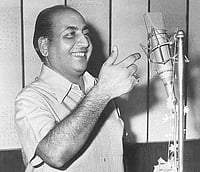Thank God, Waheeda decided to do this book and Nasreen Munni Kabir persuaded her where many others have failed. The Q and A format, carrying Waheeda’s responses verbatim, works, and in the process, we have a portrait of an actress of rare dignity and grace, who through her career refused to act like a star, despite being one of the biggest and most successful actresses of her time.
The book is elegantly produced, with some rare photos, recalling to mind the quiet beauty and professionalism that Waheeda brought to her films. The questions lead from her childhood, where Waheeda shares some little known facts about her parents, especially her father, who was in the IAS. Memories of happy times, when the family went on picnics, when her father went on deer hunting expeditions with his friends, dissolve as the pages turn to cover her early years as a dancing star after her father’s sudden death, getting ‘discovered’ by Guru Dutt, and her moving to Bombay to join his production unit to act in his films.
When Waheeda says she believes she is “most like Rosie (in Guide)...a straightforward woman who knows her own mind and stands by what she believes in”, it sums up what she is like in real life. Kabir manages to get great insights about her work with Guru Dutt in the making of Pyaasa, Kagaz Ke Phool and the filming of songs, but the personal questions that have hung over the relationship between the iconic director and his star actress remain unasked, and therefore unanswered. Rightly so, for it is not mere gossip, but what we get is a chronicle of professional interaction between two great artists.
Naturally, there are numerous interesting anecdotes. For instance, while shooting for Mujhe Jeene Do in the ravines of Chambal, she meets the daughter of a real woman dacoit who looks at Waheeda and says, “My mother never wore a ghaghra-choli, she wore pants.” She talks about trying to understand the great K. Asif, who directed his actors in telegraphic monosyllables. She discusses the difficulty of holding on to a mood and dialogue through breaks and retakes. The pluses and minuses of colour versus black and white, how her dialogue delivery was second to her ability to emote through facial expressions.
We meet a number of her co-stars. Dev Anand, who she speaks of with affection, saying he was a “gentle flirt”, Raj Kapoor, whom once she and her sister and hair-dresser had to physically hold down, to hold him back from taking on a mob of unruly fans single-handedly, and Dilip Kumar, who she says is “very lovable, sweet and nice. He has a lovely smile”. And then there is Rajendra Kumar, whom she once asked, “If you cry so much Rajendraji, how will I cry?” Singers too get their share of space as she shares her memories of Lata and Asha and Geeta, while they sang the songs she portrayed on screen. Waheeda reveals too that unlike many others, she would actually learn the words and sing the songs out loud while shooting, even if off-tune, which is why one can see her straining a bit at the throat!
Her marriage to her co-star of Shagoon, Shashi Rekhi, and their life away from the limelight in a farmhouse outside Bangalore, show up the true grit of the woman. The story of why she let herself go grey is amazing in someone who has experienced the magic of stardust and been in the arc lights for more than three decades! Despite the interesting stories revolving around her films, it is in the last segment of the book that Waheeda the woman shines through. There is a candour and forthrightness in her responses, in the way she has faced the toughest moments of her life; in her sharing of happy moments with her friends Nanda, Helen, Sadhana, Asha Parekh and Shammi Rabadi. When she ends the conversation, it is with: “I don’t honestly like living in the past. It is the present that counts. I don’t think of the future either. Maybe that’s what gives me a sense of peace. I don’t worry about what will happen tomorrow.”
One realises how Waheeda Rehman has remained the way she has, despite the topsy turvy world she has inhabited. Graceful, collected and very much her own person.


























